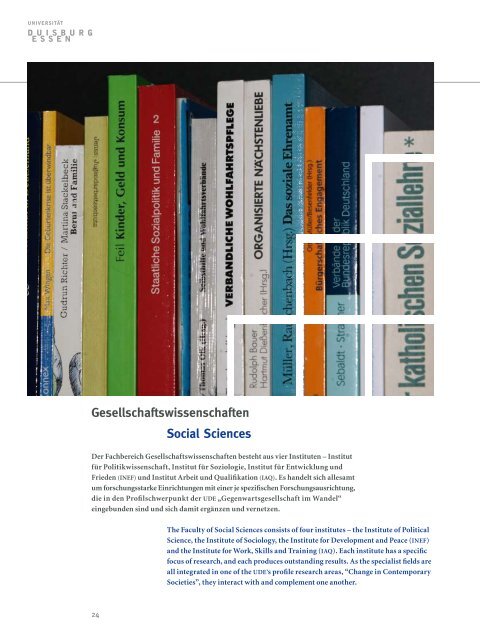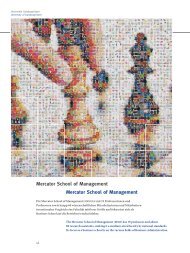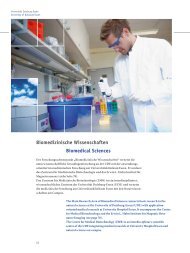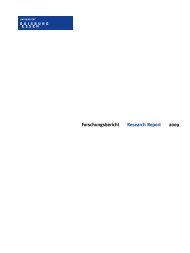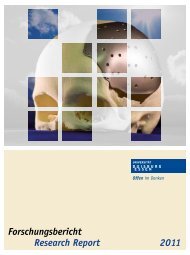download - Forschungsbericht der Universität Duisburg-Essen
download - Forschungsbericht der Universität Duisburg-Essen
download - Forschungsbericht der Universität Duisburg-Essen
Erfolgreiche ePaper selbst erstellen
Machen Sie aus Ihren PDF Publikationen ein blätterbares Flipbook mit unserer einzigartigen Google optimierten e-Paper Software.
Gesellschaftswissenschaften<br />
Social Sciences<br />
Der Fachbereich Gesellschaftswissenschaften besteht aus vier Instituten – Institut<br />
für Politikwissenschaft, Institut für Soziologie, Institut für Entwicklung und<br />
Frieden (INEF) und Institut Arbeit und Qualifikation (IAQ). Es handelt sich allesamt<br />
um forschungsstarke Einrichtungen mit einer je spezifischen Forschungsausrichtung,<br />
die in den Profilschwerpunkt <strong>der</strong> UDE „Gegenwartsgesellschaft im Wandel“<br />
eingebunden sind und sich damit ergänzen und vernetzen.<br />
The Faculty of Social Sciences consists of four institutes – the Institute of Political<br />
Science, the Institute of Sociology, the Institute for Development and Peace (INEF)<br />
and the Institute for Work, Skills and Training (IAQ). Each institute has a specific<br />
focus of research, and each produces outstanding results. As the specialist fields are<br />
all integrated in one of the UDE’s profile research areas, “Change in Contemporary<br />
Societies”, they interact with and complement one another.<br />
24
Gesellschaftswissenschaften<br />
Social Sciences<br />
Institut für Politikwissenschaft<br />
Die politische Welt ist durch Phänomene <strong>der</strong><br />
Entgrenzung gekennzeichnet. Vorbei scheint die<br />
Zeit, in <strong>der</strong> man die Lösung gesellschaftlicher<br />
Probleme als exklusive Angelegenheit von souveränen<br />
Regierungen von Nationalstaaten begreifen<br />
konnte. Mit fortschreiten<strong>der</strong> gesellschaftlicher<br />
Differenzierung wachsen gleichzeitig aber auch<br />
die Erwartungen <strong>der</strong> Bürger an die Leistungsfähigkeit<br />
<strong>der</strong> Politik. Zivilgesellschaftliche<br />
Akteure und solche <strong>der</strong> Wirtschaft, nationale,<br />
aber auch transnationale Nicht-Regierungsorganisationen<br />
sind heute ebenso wie global operierende<br />
Konzerne zu wichtigen Spielern in <strong>der</strong><br />
politischen Arena geworden. Zugleich setzt die<br />
Wirtschaft den Gestaltungsspielräumen staatlicher<br />
Akteure immer engere Grenzen. Verbindliches<br />
Entscheiden im formalen Rahmen hierarchischer<br />
„government“-Strukturen mit Regierungen und<br />
Verwaltungen verliert an Bedeutung und wird<br />
mit unterschiedlicher Geschwindigkeit ersetzt<br />
durch „governance“: komplexe Abstimmungs-,<br />
Koordinations- und Verhandlungsprozesse in<br />
plurizentrischen Netzwerkstrukturen.<br />
Vor diesem Hintergrund untersucht das<br />
Institut für Politikwissenschaft neue Formen<br />
von „governance“ (einschließlich <strong>der</strong> nach wie<br />
vor vorhandenen „government“-Elemente) für<br />
Industrie-, Transformations- und Entwicklungslän<strong>der</strong>.<br />
Es arbeitet dabei eng mit deutschen und<br />
internationalen Partnern zusammen, so unter<br />
an<strong>der</strong>em mit <strong>der</strong> Nankai University sowie <strong>der</strong><br />
Fudan University / Shanghai (VR China), die<br />
University of Stellenbosch (Südafrika) o<strong>der</strong> dem<br />
Australian Center for Peace and Conflict Studies<br />
in Brisbane (Australien). Die Forschung ist entlang<br />
dreier Schwerpunkte strukturiert: Der<br />
Schwerpunkt „global governance“ widmet sich<br />
<strong>der</strong> Frage, wie globale Probleme angesichts des<br />
Globalisierungsprozesses und <strong>der</strong> geschwächten<br />
Regelungskompetenz des Nationalstaates durch<br />
eine Kooperation staatlicher, internationaler und<br />
nicht-staatlicher Akteure erfolgreich bearbeitet<br />
werden können. Im Schwerpunkt „governance<br />
and government in world regions“ geht es um<br />
Probleme des politischen Gestaltens in drei aus-<br />
Institute of Political Science<br />
The political world is characterised by phenomena<br />
of delimitation. It seems the days when<br />
resolving social problems fell exclusively to the<br />
sovereign government of a nation state are long<br />
gone. Yet as society becomes increasingly differentiated,<br />
its citizens’ expectations of government<br />
capabilities also rise. Civil society and economic<br />
actors alike, national and also transnational<br />
non-government organisations and companies<br />
operating on a global scale have all become important<br />
players in the political arena. Meanwhile,<br />
the economy is narrowing state actors’<br />
room for manoeuvre. Binding decision-making<br />
in the formal context of hierarchical “government”<br />
structures (governments and administrations)<br />
is becoming less important, to be replaced<br />
Dekan / Dean: Prof. Gerhard Bäcker<br />
<strong>Forschungsbericht</strong> Research Report 2008<br />
25
gewählten Weltregionen, für die das Institut<br />
beson<strong>der</strong>e Expertise besitzt: Europa, Ost- und<br />
Südostasien sowie das sub-saharische Afrika.<br />
Der Forschungsschwerpunkt „democratic governance“<br />
reagiert auf die zunehmende Komplexität<br />
<strong>der</strong> Vorbereitung, Herstellung und Implementation<br />
politischer Entscheidungen in <strong>der</strong> Bundesrepublik<br />
Deutschland. Zu den erforschten Themenkreisen<br />
gehören Probleme <strong>der</strong> Verwaltungsmo<strong>der</strong>nisierung<br />
einschließlich des Einsatzes neuer Informationsund<br />
Kommunikationstechnologien, Managementprobleme<br />
des Regierens in Bund und Län<strong>der</strong>n<br />
einschließlich <strong>der</strong> medialen und nicht-medialen<br />
Politikvermittlung und ihres Einflusses auf die<br />
öffentliche Meinung sowie Aspekte von „urban<br />
governance“, das heißt politischer Steuerung und<br />
institutionellen Arrangements in zentralen Fel<strong>der</strong>n<br />
<strong>der</strong> Stadtpolitik.<br />
Unter an<strong>der</strong>em wurden in den letzten beiden<br />
Jahren die folgenden Forschungsprojekte bearbeitet<br />
und abgeschlossen, die sich in kompetitiven<br />
Antragsverfahren hatten durchsetzen können:<br />
• „Konfliktbeilegung durch Europäisierung?<br />
Griechenland und seine Nachbarn Mazedonien<br />
und Türkei“, Volkswagen Stiftung<br />
(Prof. Heinz-Jürgen Axt),<br />
• „Kampagnendynamik 2005. Eine Rolling Cross-<br />
Section / Panel-Studie zu den Wirkungen des<br />
Wahlkampfes bei <strong>der</strong> vorgezogenen Bundestagswahl<br />
2005“, DFG (Prof. Rüdiger Schmitt-Beck),<br />
• „Herstellung und Sicherung kollektiv verbindlicher<br />
politisch-administrativer Entscheidungen<br />
im Rahmen eines Kommunalisierungsprozesses“,<br />
DFG (Prof. Dieter Grunow),<br />
• „Wahlen, Partizipation und soziale Stabilität<br />
in Chinas Dörfern und städtischen Wohnvierteln“,<br />
DFG (Prof. Dr. Thomas Heberer),<br />
• „Party-Bans in Africa“, Fritz-Thyssen-Stiftung<br />
(Prof. Christof Hartmann, zusammen<br />
mit Prof. Matthijs Boogards (Jacobs University<br />
Bremen); Dr. Matthias Basedau (GIGA, Hamburg)<br />
und Prof. Peter Niesen (TU Darmstadt)).<br />
Institut für Soziologie<br />
Das Institut für Soziologie konzentriert seine<br />
Forschung auf das Themenfeld „Neue Arbeitsge-<br />
at varying rates by “governance”: complex processes<br />
of consultation, coordination and negotiation<br />
in pluricentric networks.<br />
Against this backdrop, the Institute of Political<br />
Science analyses new forms of governance (including<br />
the still existent forms of government)<br />
in industrial, transformation and developing<br />
countries. The institute works closely with national<br />
and international partners, including<br />
Nankai University and Fudan University<br />
(Shanghai / PR China), the University of Stellenbosch<br />
(South Africa), and the Australian Centre<br />
for Peace and Conflict Studies in Brisbane (Australia).<br />
Research is structured around three focal<br />
areas: “global governance” analyses how, in the<br />
face of the globalisation process and diminished<br />
ruling authority of national states, global problems<br />
can be solved by cooperation between state,<br />
international and non-state actors. “Governance<br />
and government in world regions” meanwhile<br />
looks at policy-making problems in three different<br />
world regions in which the institute has particular<br />
expertise: Europe, East and Southeast<br />
Asia, and Sub-Saharan Africa. The “democratic<br />
governance” research focus responds to the<br />
growing complexity of preparing, making and<br />
implementing political decisions in the Fe<strong>der</strong>al<br />
Republic of Germany. Research concerns the<br />
problems of administrative mo<strong>der</strong>nisation, including<br />
implementation of new information and<br />
communication technologies, public management<br />
problems at fe<strong>der</strong>al and state government<br />
level, including media and non-media political<br />
communication and its influence on public<br />
opinion, and aspects of urban governance, or<br />
political steerage and institutional arrangements<br />
in central areas of urban politics.<br />
The following research projects, all competitive<br />
application procedures, have been conducted<br />
and completed in the past two years:<br />
• “Konfliktbeilegung durch Europäisierung?<br />
Griechenland und seine Nachbarn Mazedonien<br />
und Türkei” [Conflict resolution through<br />
Europeanisation? Greece and its neighbours<br />
Macedonia and Turkey], Volkswagen Foundation<br />
(Prof. Heinz-Jürgen Axt)<br />
26
Gesellschaftswissenschaften<br />
Social Sciences<br />
sellschaft und Soziale Integration“. Angeknüpft<br />
wird hier an die „klassische“ Fragestellung nach<br />
dem Verhältnis von Arbeitsteilung und Solidarität.<br />
War diese Fragestellung zunächst in <strong>der</strong><br />
Phase des Übergangs von <strong>der</strong> Agrar- zur Industriegesellschaft<br />
formuliert worden, so stellt sich<br />
jetzt die Aufgabe, sie unter den Bedingungen<br />
einer mo<strong>der</strong>nen Wissens- und Dienstleistungsgesellschaft<br />
neu zu interpretieren und zu untersuchen.<br />
Dies setzt voraus, die Wandlungstendenzen<br />
auf den unterschiedlichen Ebenen <strong>der</strong> Gesellschaft<br />
(Individuum, Gruppe, Netzwerk, Organisationen,<br />
Institutionen)zu analysieren und<br />
dabei zugleich eine transnationale und international<br />
vergleichende Perspektive zu verfolgen. Die<br />
Entwicklung und Anwendung von unterschiedlichsten<br />
Methoden <strong>der</strong> Umfrage- und Sozialforschung<br />
ergänzen das Profil, das in einer Reihe<br />
von Vorhaben fortgesetzt wurde.<br />
So zeigen die ersten Ergebnisse eines DFG-finanzierten<br />
Forschungsverbundes mit Sozialforschern<br />
<strong>der</strong> Universität Bielefeld zum Thema „Beschäftigungsverhältnisse<br />
als sozialer Tausch“, dass<br />
staatliche und betriebliche Unterstützungsleistungen<br />
für Familien in ihrer Wirksamkeit und<br />
Inanspruchnahme entscheidend von den<br />
jeweiligen Grundarrangements betrieblicher<br />
Personalpolitik beeinflusst werden. Betriebliche<br />
Personalpolitik ist demnach immer auch Familienpolitik<br />
(Prof. Hans-Georg Brose).<br />
Eine 2008 abgeschlossene Untersuchung,<br />
die durch die internationale Studiengruppe <strong>der</strong><br />
VW Stiftung „Kulturelles Kapital in <strong>der</strong> Migration“<br />
durchgeführt wurde, hat als Ergebnis, dass<br />
die erfolgreiche Arbeitsmarktintegration hochqualifizierter<br />
Migranten nicht nur vom Arbeitsmarkt-<br />
und Migrationsrecht, son<strong>der</strong>n auch von<br />
<strong>der</strong> berufsspezifischen (in-)formellen Verwertbarkeit<br />
ihrer Bildungstitel und Kompetenzen<br />
abhängig ist. Die methodischen Grundlagen<br />
<strong>der</strong> soziologischen Migrationsforschung<br />
wurden zudem Nachwuchswissenschaftlern<br />
aus 19 Län<strong>der</strong>n im Rahmen einer internationalen<br />
Summer School (in Kooperation mit<br />
<strong>der</strong> Ruhr Universität Bochum) näher gebracht<br />
(Jun.Prof. Anja Weiß).<br />
•<br />
•<br />
•<br />
•<br />
“Kampagnendynamik 2005. Eine Rolling<br />
Cross-Section / Panel-Studie zu den Wirkungen<br />
des Wahlkampfes bei <strong>der</strong> vorgezogenen<br />
Bundestagswahl 2005” [Campaign Dynamics<br />
2005. A rolling cross-section / panel analysis<br />
on the effects of the campaign in the 2005<br />
German General Election], German Research<br />
Foundation (DFG) (Prof. Rüdiger Schmitt-Beck)<br />
“Herstellung und Sicherung kollektiv verbindlicher<br />
politisch-administrativer Entscheidungen<br />
im Rahmen eines Kommunalisierungsprozesses”<br />
[The making and securing of<br />
political-administrative decisions in the<br />
framework of a municipalisation process],<br />
DFG (Prof. Dieter Grunow)<br />
“Wahlen, Partizipation und soziale Stabilität<br />
in Chinas Dörfern und städtischen Wohnvierteln”<br />
[Elections, participation and social<br />
stability in China’s villages and urban neighbourhoods],<br />
DFG (Prof. Thomas Heberer)<br />
“Party-Bans in Africa”, Fritz-Thyssen Foundation<br />
(Prof. Christof Hartmann, together with<br />
Prof. Matthijs Boogards (Jacobs University<br />
Bremen); Dr. Matthias Basedau (GIGA, Hamburg)<br />
and Prof. Peter Niesen (Darmstadt University<br />
of Technology)).<br />
The Institute of Sociology<br />
The “New World of Work and Social Integration”<br />
is the theme of research at the Institute of<br />
Sociology. It picks up on the classic sociological<br />
question of the relationship between the division<br />
of labour and solidarity. This issue was first addressed<br />
during the transition from an agrarian<br />
to an industrial society; today, the task is to reinterpret<br />
and examine it un<strong>der</strong> the terms of the<br />
contemporary knowledge and service society. To<br />
do this, transformation tendencies on different<br />
levels of society (individual, group, network, organisations,<br />
institutions) must be traced and simultaneously<br />
consi<strong>der</strong>ed from a comparative<br />
transnational and international perspective. Development<br />
and application of different social research<br />
and survey methods complement the profile<br />
un<strong>der</strong> which a range of projects has been<br />
conducted.<br />
<strong>Forschungsbericht</strong> Research Report 2008<br />
27
•<br />
•<br />
•<br />
•<br />
•<br />
•<br />
•<br />
•<br />
•<br />
•<br />
Zentrale Publikationen<br />
Selected Publications<br />
Axt, H.-J., O. Schwarz, S. Wiegand (2008): Konfliktbeilegung<br />
durch Europäisierung? – Zypernfrage, Ägäis-Konflikt und griechisch-mazedonischer<br />
Namensstreit. Baden-Baden: Nomos.<br />
Bäcker, G., G. Naegele, R. Bispinck, J Neubauer (2008): Sozialpolitik<br />
und soziale Lage in Deutschland, 2 Bände. Wiesbaden:<br />
VS-Verlag.<br />
Bielefeldt, H., V. Deile, B. Hamm, F.-J. Hutter, S. Kurtenbach,<br />
H. Tretter (Hrsg.) (2008) : Jahrbuch Menschenrechte: Religionsfreiheit.<br />
Wien/Köln/Weimar: Böhlau Verlag.<br />
Bosch, G. C., Weinkopf (eds.) (2008): Low-wage work in Germany.<br />
New York: Russell Sage Foundation. The Russell Sage<br />
Foundation Case Studies of Job Quality in Advanced Economies.<br />
Delhees, S., K.-R. Korte, F. Schartau, N. Switek, K. Weissenbach<br />
(2008): Wohlfahrtsstaatliche Reformkommunikation. Westeuropäische<br />
Parteien auf Mehrheitssuche. Baden-Baden: Nomos.<br />
Hartmann, C., G. Crawford (2008): Decentralisation in Africa:<br />
A Pathway out of Poverty and Conflict? Amsterdam: Amsterdam<br />
University Press 2008.<br />
Schmitt-Beck, R., T. Debiel, K.-R. Korte (Hrsg.) (2008): Governance<br />
and Legitimacy in a Globalized World. Baden-Baden:<br />
Nomos.<br />
Schulz-Schaeffer, I. (2008): Die drei Logiken <strong>der</strong> Selektion.<br />
Handlungstheorie als Theorie <strong>der</strong> Situationsdefinition – The<br />
Three Logics of Selection. Theory of Action as Theory of Defining<br />
the Situation. In: Zeitschrift für Soziologie, 37 (5).<br />
Shire, K. (2008): White-Collar Work, In: Oxford Encyclopedia<br />
of the Mo<strong>der</strong>n World. Oxford University Press.<br />
Ulbert, C., S. Werthes (Hrsg.) (2008): Menschliche Sicherheit –<br />
Globale Herausfor<strong>der</strong>ungen und regionale Perspektiven, EINE<br />
WELT-Texte <strong>der</strong> Stiftung Entwicklung und Frieden, Bd. 21. Baden-<br />
Baden: Nomos.<br />
In zwei internationalen Verbünden, geför<strong>der</strong>t<br />
durch die „Japan Society for the Promotion of<br />
Science“, fanden <strong>Duisburg</strong>er Soziologen eine<br />
wesentliche Ursache von wachsenden sozialen<br />
Ungleichheiten in <strong>der</strong> Erweiterung von temporären<br />
Arbeitsverhältnissen, die zunehmend von etablierten<br />
Formen sozialer Leistungen sowie des Arbeitsschutzes<br />
und damit von staatlichen Regulierungen<br />
abgekoppelt werden (Prof. Karen Shire).<br />
The initial findings of a DFG-funded research<br />
project dealing with “Employment Relationships<br />
as Social Exchange”, which has been un<strong>der</strong>taken<br />
in cooperation with social scientists at the University<br />
of Bielefeld, show that the fundamental<br />
arrangements of company personnel policy are<br />
decisive in determining the effectiveness and takeup<br />
of state and employer provisions for families.<br />
In this sense, company personnel policy is always<br />
also family policy (Prof. Hans-Georg Brose).<br />
Results of a study concluded in 2008 by the<br />
international study group of the VW Foundation<br />
(“Cultural Capital in Migration”) reveal that successful<br />
integration of highly qualified migrants into<br />
the labour market is not only dependent on labour<br />
legislation and migration law, but also on the extent<br />
to which their qualifications and skills are of<br />
(in)formal use in specific occupations. At an International<br />
Summer School (in cooperation with the<br />
Ruhr-University Bochum), junior scientists from<br />
19 countries had the opportunity to learn more<br />
about the methodological principles of sociological<br />
migration research (Jun. Prof. Anja Weiß).<br />
In two international networks sponsored by the<br />
Japan Society for the Promotion of Science,<br />
<strong>Duisburg</strong>’s sociologists identified the shift towards<br />
temporary employment relationships as a major<br />
cause of growing social inequalities, since they are<br />
increasingly detached from established forms of social<br />
security and employment protection, and thereby<br />
from government regulation (Prof. Karen Shire).<br />
<strong>Duisburg</strong>’s sociologists also made progress in<br />
Survey Methodologies, developing not only a new<br />
archiving tool for survey questions and data but<br />
also new methods of protecting linked personal<br />
data more effectively. In 2008, <strong>Duisburg</strong>’s focus on<br />
method development was consolidated as the<br />
Institute of Sociology became the coordination<br />
centre for DFG Priority Programme 1292 “Survey<br />
Methodology” (in cooperation with the University<br />
of Bremen and the DIW, Berlin) (Prof. Rainer Schnell).<br />
Alongside editorial roles for a range of Germanlanguage<br />
journals, researchers from <strong>Duisburg</strong><br />
also held leading positions in the German Sociological<br />
Association (GSA) and (co-)edited two international<br />
open access journals, Survey Research<br />
28
Gesellschaftswissenschaften<br />
Social Sciences<br />
Fortschritte auf dem Gebiet <strong>der</strong> „Survey<br />
Methodologies“ erreichten <strong>Duisburg</strong>er Soziologen,<br />
u. a. durch die Entwicklung eines Archivierungstools<br />
für Survey-Fragen und Survey-Daten sowie<br />
durch neue Maßnahmen, die personenbezogene<br />
Daten im Linking von Datensätzen besser schützen.<br />
Im Jahr 2008 wurde <strong>der</strong> <strong>Duisburg</strong>er Schwerpunkt<br />
in <strong>der</strong> Methodenentwicklung durch die<br />
im Institut für Soziologie angesiedelte Koordination<br />
des DFG-Schwerpunkts 1292 „Survey Methodology“<br />
(in Kooperation mit <strong>der</strong> Universität<br />
Bremen und dem DIW, Berlin) fest verankert<br />
(Prof. Rainer Schnell).<br />
Neben Herausgeberschaften in einer Reihe<br />
von deutschsprachigen Zeitschriften und Leitungsfunktionen<br />
bei <strong>der</strong> Deutschen Gesellschaft für<br />
Soziologie wurden im Jahr 2008 zwei internationale<br />
„open access“ Zeitschriften von <strong>Duisburg</strong>er<br />
Soziologen redaktionell (mit)geleitet: „Survey<br />
Research Methods“ und „Science, Technology,<br />
and Innovation Studies“. In 2008 wurden von<br />
<strong>Duisburg</strong> aus zudem mehrere Panels des „International<br />
Sociological Association Forum“ und<br />
„Research Committees“ geleitet. Mehrere Forschungsvorhaben<br />
wurden in internationalen<br />
Verbünden realisiert, die von Ostasien bis Nordamerika<br />
reichten.<br />
Institut Entwicklung und Frieden<br />
Das Institut für Entwicklung und Frieden<br />
bearbeitet als einziges deutsches Forschungsinstitut<br />
Fragen an <strong>der</strong> Schnittstelle von Entwicklung<br />
und Frieden und verbindet Grundlagenforschung<br />
mit anwendungsorientierter Forschung<br />
und Politikberatung. Die Forschung des INEF<br />
lässt sich glie<strong>der</strong>n in die Auseinan<strong>der</strong>setzung mit<br />
Globalisierungsprozessen und <strong>der</strong>en politische<br />
Gestaltung auch im Hinblick auf menschliche<br />
Sicherheit, die Analyse von Gewaltkonflikten und<br />
Strategien zur friedlichen Konfliktbearbeitung<br />
und in Fragen von internationaler Entwicklungsund<br />
Menschenrechtspolitik. Entwicklungsgesellschaften<br />
bzw. Staaten, die Fragilität aufweisen,<br />
stehen im Fokus <strong>der</strong> Untersuchungen:<br />
Im Fokus „Fragile Staatlichkeit und Nachkriegsgesellschaften“<br />
(Prof. Tobias Debiel), führte das<br />
Methods and Science, Technology, and Innovation<br />
Studies.<br />
<strong>Duisburg</strong> sociologists additionally headed<br />
several panels of the International Sociological<br />
Association Forum and research committees in<br />
2008. Numerous research projects were un<strong>der</strong>taken<br />
in international networks from East Asia<br />
to North America.<br />
Institute for Development and Peace<br />
The Institute for Development and Peace (INEF)<br />
is the only German research institute to work on<br />
questions arising at the interface between peace<br />
and development, and combines basic with applied<br />
research and public policy consulting. INEF research<br />
can be classified into three main areas:<br />
analysing globalisation processes and related<br />
questions of governance with special emphasis<br />
on human security, the examination of violent<br />
conflicts and strategies for peaceful conflict<br />
management, and issues of international development<br />
and human rights policies. Developing<br />
societies and fragile states are at the centre of the<br />
institute’s research work: “Fragile statehood and<br />
post-conflict societies” is the subject of one research<br />
area, headed by Prof. Tobias Debiel, in<br />
which INEF conducted several projects and was<br />
represented by an international panel at the 2008<br />
annual conference of the International Peace<br />
Research Association (ipra) in Leuven / Belgium.<br />
“Social and Political Fractures after Wars – The Role<br />
of Youth Violence in Cambodia and Guatemala”<br />
(Prof. Franz Nuscheler / Dr. Sabine Kurtenbach)<br />
was one particularly important research project,<br />
which was funded by the German Foundation<br />
for Peace Research (DSF) and involved cooperation<br />
on an international level.<br />
A new INEF project launched in the summer un<strong>der</strong><br />
Dr. Cornelia Ulbert and PD Dr. Jochen Hippler<br />
looks at the contribution of migrant groups<br />
to resolving conflicts in their home countries.<br />
“INFOCON – International Civil Society Forum<br />
on Conflicts” is funded by the EU Commission<br />
un<strong>der</strong> the EU Seventh Framework Programme<br />
and conducted jointly between civil society and<br />
scientific institutions. Comparative studies are<br />
<strong>Forschungsbericht</strong> Research Report 2008<br />
29
INEF mehrere Forschungsprojekte durch und war<br />
mit einer eigenen, international besetzten Sektion<br />
auf <strong>der</strong> Jahrestagung <strong>der</strong> International Peace<br />
Research Association (ipra) in Leuven / Belgien<br />
vertreten. Eine beson<strong>der</strong>e Bedeutung hatte das<br />
von <strong>der</strong> Deutschen Stiftung Friedensforschung<br />
(DSF) geför<strong>der</strong>te Forschungsprojekt „Gesellschaftliche<br />
und politische Umbrüche nach dem Krieg.<br />
Zur Rolle von Jugendgewalt in Kam bodscha und<br />
Guatemala“ (Prof. Franz Nuscheler / Dr. Sabine<br />
Kurtenbach), das im Kontext internationaler<br />
Kooperationen durchgeführt worden war.<br />
Mit dem Beitrag von Migrantengruppen bei<br />
<strong>der</strong> Lösung von Konflikten in ihren Heimat län<strong>der</strong>n<br />
beschäftigt sich ein INEF-Projekt, das im<br />
Sommer unter Leitung von Dr. Cornelia Ulbert<br />
und PD Dr. Jochen Hippler die Arbeit aufnahm.<br />
„INFOCON – International Civil Society Forum<br />
on Conflicts” wird von <strong>der</strong> EU-Kommission im<br />
7. EU-Forschungsrahmenprogramm geför<strong>der</strong>t<br />
und von zivilgesellschaftlichen und wissenschaftlichen<br />
Institutionen gemeinsam durchgeführt.<br />
In mehreren europäischen Städten und<br />
Herkunftsregionen werden vergleichende Studien<br />
erarbeitet – das INEF ist für die Fallstudie Berlin<br />
zuständig.<br />
Das INEF hat außerdem die Umsetzung des<br />
BMZ-Leuchtturmvorhabens „Menschenrechte,<br />
Unternehmensverantwortung und nachhaltige<br />
Entwicklung“ übernommen. Ziel dieses Projektes<br />
– unter <strong>der</strong> Leitung von Dr. Brigitte Hamm – ist<br />
es, Unternehmen bei <strong>der</strong> Wahrnehmung menschenrechtlicher<br />
Verantwortung zu unterstützen<br />
und sie noch stärker in Prozesse <strong>der</strong> nachhaltigen<br />
Entwicklung einzubinden.<br />
Institut Arbeit und Qualifikation<br />
Das Forschungsteam des IAQ hat seine<br />
Kompetenzen in <strong>der</strong> Arbeitsmarkt- und Bildungsforschung<br />
verstärkt und zu wichtigen Themen<br />
<strong>der</strong> wirtschafts-, sozial- und bildungspolitischen<br />
Agenda in Deutschland Datenanalysen und<br />
Hintergrundinformationen, Beratung und<br />
Information für Betroffene, Mitwirkende und<br />
Entscheidungsträger geliefert – zum Beispiel<br />
zum demografischen Wandel und den Auswir-<br />
taking place in several European cities and native<br />
regions; INEF is responsible for the Berlin<br />
case study.<br />
INEF has also taken on the “Human Rights,<br />
Corporate Responsibility and Sustainable Development”<br />
project of the Fe<strong>der</strong>al Ministry for Economic<br />
Cooperation and Development (BMZ).<br />
Managed by Dr. Brigitte Hamm, this project aims<br />
to support companies in fulfilling their human<br />
rights responsibilities and to increase their involvement<br />
in sustainable development processes.<br />
Institute for Work, Skills and Training<br />
The research team at the Institute for Work,<br />
Skills and Training (IAQ) has consolidated its<br />
profile in labour market and educational research.<br />
It has been responsible for supplying interested<br />
parties at various levels with data analysis,<br />
background information, consultation and other<br />
information on key issues of the economic, social<br />
and education agenda in Germany. These include<br />
demographic change and its effects on the<br />
labour market, companies and social protection<br />
systems, the expansion of the low-wage sector,<br />
developments in working hours, the weakening<br />
of collective pay agreements, and the effects of<br />
labour market reform.<br />
One of the highlights in 2008 was the presentation<br />
of a study sponsored by the American<br />
Russell Sage Foundation entitled “Low-Wage<br />
Employment in Europe – Opportunities in the<br />
Workplace”. In the space of a decade, the number<br />
of low-wage earners in Germany has risen<br />
from 15 to 22.2 percent, or a total of 6.5 million.<br />
The low-wage sector in Germany already just<br />
topped the British level in 2005 – and only fell a<br />
little short of the USA. In France the figure is half<br />
the size, and it is even lower in Denmark.<br />
In 2020, over 13 percent of employees in German<br />
companies will be aged between 50 and 65,<br />
as opposed to just 9.4 percent in 2000. Aging<br />
workforces are becoming a problem for HR bosses,<br />
since the simultaneous drop in birth rates means<br />
that there is a dearth of young, qualified people.<br />
In the “Demografische Wandel und Prävention<br />
in <strong>der</strong> IT” [Demographic Change and Prevention<br />
30
Gesellschaftswissenschaften<br />
Social Sciences<br />
kungen auf Arbeitsmarkt, Betriebe und soziale<br />
Sicherungssysteme, zur Ausweitung des Niedriglohnsektors,<br />
zur Entwicklung <strong>der</strong> Arbeitszeiten,<br />
zur Schwächung des Tarifsystems sowie zu Auswirkungen<br />
<strong>der</strong> Arbeitsmarkt-Reformen.<br />
Ein Highlight 2008 war die Vorstellung <strong>der</strong><br />
von <strong>der</strong> amerikanischen Russell Sage Foundation<br />
geför<strong>der</strong>ten Studie „Low-Wage Employment in<br />
Europe – Opportunities in the Workplace“.<br />
Innerhalb eines Jahrzehnts ist <strong>der</strong> Anteil <strong>der</strong><br />
Geringverdiener in Deutschland von 15 auf<br />
22,2 Prozent gestiegen, 6,5 Millionen Beschäftigte<br />
in Deutschland „arbeiten für wenig Geld“, so <strong>der</strong><br />
Titel <strong>der</strong> deutschen Veröffentlichung. Der Niedriglohnsektor<br />
in Deutschland lag 2005 bereits knapp<br />
über dem britischen Niveau – und nur noch<br />
knapp unter dem <strong>der</strong> USA! In Frankreich ist die<br />
Quote gerade mal halb so hoch, in Dänemark ist<br />
sie noch niedriger.<br />
In deutschen Betrieben werden im Jahr 2020<br />
über 13 Prozent <strong>der</strong> Mitarbeiter zwischen 50 und<br />
65 Jahre alt sein, im Jahr 2000 waren es erst 9,4<br />
Prozent. Alternde Belegschaften werden zum<br />
Problem für die Personalchefs, denn gleichzeitig<br />
führen sinkende Geburtenraten zu Mangel an<br />
jungen Fachkräften. Das IAQ untersucht im<br />
Projekt „Demografischer Wandel und Prävention<br />
in <strong>der</strong> IT“ in Kooperation mit dem Institut für<br />
Sozialwissenschaftliche Forschung (ISF / München)<br />
und dem Büro Mo<strong>der</strong>ne Arbeitszeiten (Dortmund),<br />
wie Gesundheit und Arbeitsfähigkeit <strong>der</strong><br />
Beschäftigten in <strong>der</strong> Informations-Technik-<br />
Wirtschaft über den gesamten Erwerbsverlauf<br />
hinweg geför<strong>der</strong>t und erhalten werden können.<br />
Auf die Verbesserung <strong>der</strong> Beschäftigungschancen<br />
Älterer zielt auch das Modellprogramm<br />
„Perspektive 50plus – Beschäftigungspakte in<br />
den Regionen“ <strong>der</strong> Bundesregierung. Zwischen<br />
Anfang 2008 und Mitte 2011 evaluiert das IAQ<br />
dieses Programm im Auftrag des Bundesarbeitsministeriums.<br />
Auf <strong>der</strong> politischen Tagesordnung stehen<br />
zurzeit integrierte Dienstleistungen für Kin<strong>der</strong><br />
und Familien, z. B. in Familienzentren und über<br />
Soziale Frühwarnsysteme, weit oben. Das IAQ<br />
arbeitet an arbeitsmarktorientierten Konzepten<br />
•<br />
•<br />
•<br />
•<br />
•<br />
•<br />
•<br />
•<br />
•<br />
•<br />
•<br />
•<br />
•<br />
Professorinnen und Professoren<br />
Professors<br />
Prof. Heinz-Jürgen Axt<br />
Prof. Gerhard Bäcker<br />
Prof. Ulrike Berendt<br />
Prof. Gerhard Bosch<br />
Prof. Hans-Georg Brose<br />
Prof. Tobias Debiel<br />
Prof. Frank Faulbaum<br />
Prof. Dieter Grunow<br />
Prof. Othmar Haberl<br />
Prof. Christof Hartmann<br />
Prof. Thomas Heberer<br />
Prof. Heidrun Hoppe-Treutner<br />
Prof. Doris Janshen †<br />
in IT] project, conducted in cooperation with the<br />
Institut für Sozialwissenschaftliche Forschung<br />
(ISF München) and Büro Mo<strong>der</strong>ne Arbeitszeiten<br />
(Dortmund), the IAQ is investigating how the<br />
health of employees in the IT sector and their<br />
ability to work can be promoted and preserved<br />
throughout their working life.<br />
A Fe<strong>der</strong>al Government pilot programme entitled<br />
“Perspektive 50plus – Beschäftigungspakte<br />
in den Regionen”, which aims to improve the<br />
employment opportunities of the over 50s, is being<br />
evaluated by the IAQ on behalf of the Fe<strong>der</strong>al<br />
Ministry of Labour and Social Affairs (BMAS).<br />
Evaluation began at the beginning of 2008 and<br />
will run until mid-2011.<br />
Integrated services for children and families<br />
– for example in relation to Family Centres and<br />
social early warning systems – are top of the current<br />
political agenda. The IAQ is working on concepts<br />
relating to the labour market for flexible<br />
childcare (development of local models, international<br />
comparisons), quality management, organisational<br />
development and management at<br />
the interface between school, occupation and<br />
further education. The institute has now em-<br />
•<br />
•<br />
•<br />
•<br />
•<br />
•<br />
•<br />
•<br />
•<br />
•<br />
•<br />
•<br />
•<br />
Prof. Matthias Knuth<br />
Prof. Karl-Rudolf Korte<br />
Prof. Stefan Liebig<br />
Prof. Renate Martinsen<br />
Prof. Hans Nokielski<br />
Prof. Rainer Schnell<br />
Prof. Karen Shire<br />
Prof. Petra Stein<br />
Prof. Rüdiger Schmitt-Beck<br />
Prof. Hermann Strasser<br />
Prof. Anja Weiß<br />
Prof. Lothar Zechlin<br />
Prof. Jochen Zimmer<br />
<strong>Forschungsbericht</strong> Research Report 2008<br />
31
einer flexiblen Kin<strong>der</strong>betreuung (Aufbau lokaler<br />
Praxismodelle und internationale Vergleiche),<br />
Qualitätsmanagement, Organisationsentwicklung<br />
und dem Schnittstellenmanagement zwischen<br />
Schule, Beruf und Weiterbildung. Aktuell<br />
in Angriff genommen wurde jetzt das Projekt<br />
„Benchmarking in Kin<strong>der</strong>tageseinrichtungen:<br />
Wertschöpfung durch Wertschätzung“, das in<br />
einer Befragung von 10.000 Kin<strong>der</strong>tageseinrichtungen<br />
aktuelle Themen zur Organisationsentwicklung<br />
aufgreift und statistisch aufbereitet.<br />
Perspektiven<br />
Mit <strong>der</strong> Etablierung des sozialwissenschaftlichen<br />
Profilschwerpunkts sind die Voraussetzungen<br />
dafür geschaffen worden, dass sich die<br />
sozialwissenschaftliche Forschung in den Instituten<br />
des Fachbereichs und fachbereichsübergreifend<br />
vernetzt. Ziel für die nächsten Jahre ist<br />
es, auf dieser Basis umfassende Forschungsprojekte<br />
zu realisieren. Bereits im Jahre 2009<br />
werden mehrere neue Vorhaben, geför<strong>der</strong>t unter<br />
an<strong>der</strong>em durch die DFG, die VW-Stiftung, die<br />
Haniel-Stiftung, das BMBF, das BMZ, gestartet,<br />
die aus mehrdimensionaler Perspektive und mit<br />
unterschiedlichen Schwerpunkten Umbruchsprozesse<br />
von Gegenwartsgesellschaften analysieren.<br />
barked on a project un<strong>der</strong> the name of “Benchmarking<br />
in Kin<strong>der</strong>tageseinrichtungen:<br />
Wertschöpfung durch Wertschätzung”, which<br />
picks up on themes relating to organisational development<br />
and prepares statistics based on a survey<br />
of 10,000 daycare centres for children.<br />
Outlook<br />
Consolidation of the social science profile<br />
has created the basis for closer links between social<br />
science research within the faculty’s institutes<br />
and beyond. The aim in the coming years is<br />
to un<strong>der</strong>take further comprehensive research<br />
projects on the same basis. Several new research<br />
projects are to be launched in 2009, with funding<br />
from sources such as the DFG, the Volkswagen<br />
Foundation, the Haniel Foundation, the Fe<strong>der</strong>al<br />
Ministry of Education and Research (BMBF), and<br />
the Fe<strong>der</strong>al Ministry for Economic Cooperation<br />
and Development (BMZ). These projects will<br />
analyse processes of change in contemporary societies<br />
from a multidimensional perspective and<br />
with different points of emphasis.<br />
32
Gesellschaftswissenschaften<br />
Social Sciences<br />
Kontakt<br />
Contact<br />
Dekanat Gesellschaftswissenschaften<br />
Universität <strong>Duisburg</strong>-<strong>Essen</strong><br />
Lotharstraße 63<br />
47057 <strong>Duisburg</strong><br />
Tel.: +49 (0) 203 / 379 - 24 14<br />
Fax: +49 (0) 203 / 379 - 34 80<br />
dekanat@gesellschaftswissenschaften.uni-due.de<br />
http://www.uni-duisburg-essen.de/gesellschaftswissenschaften/<br />
<strong>Forschungsbericht</strong> Research Report 2008<br />
33


